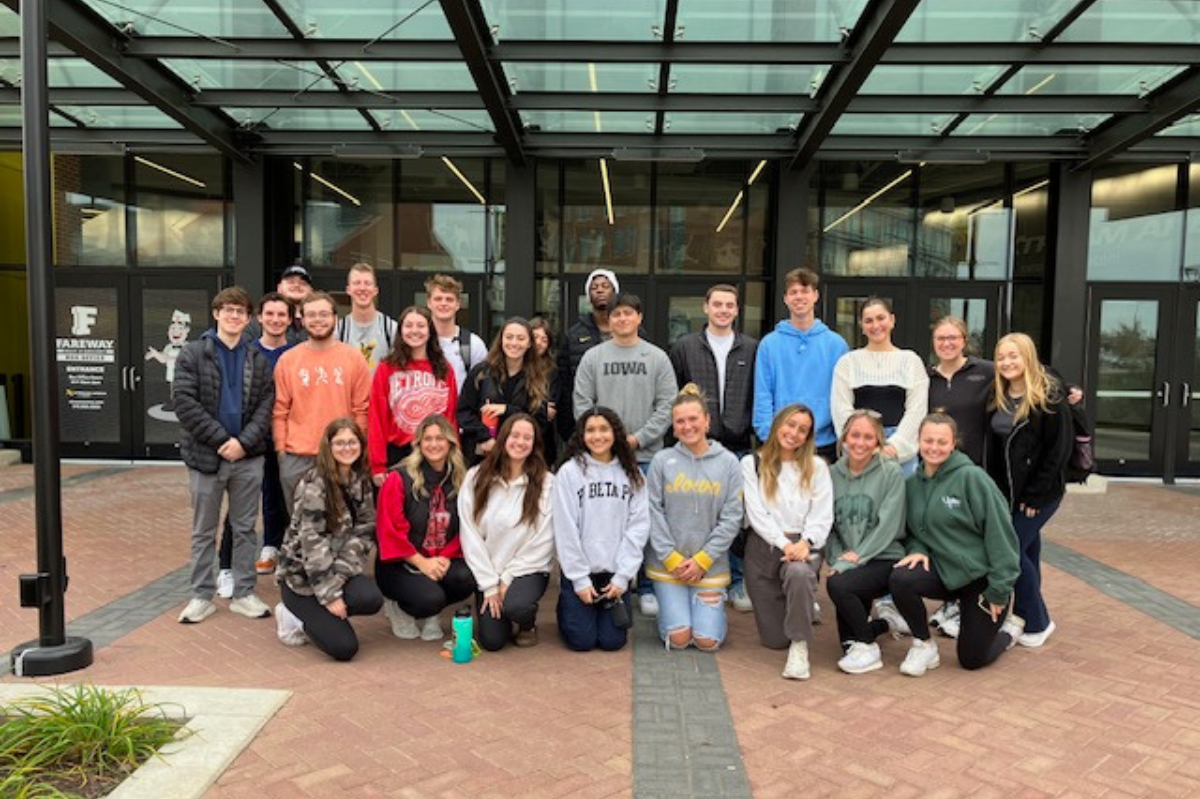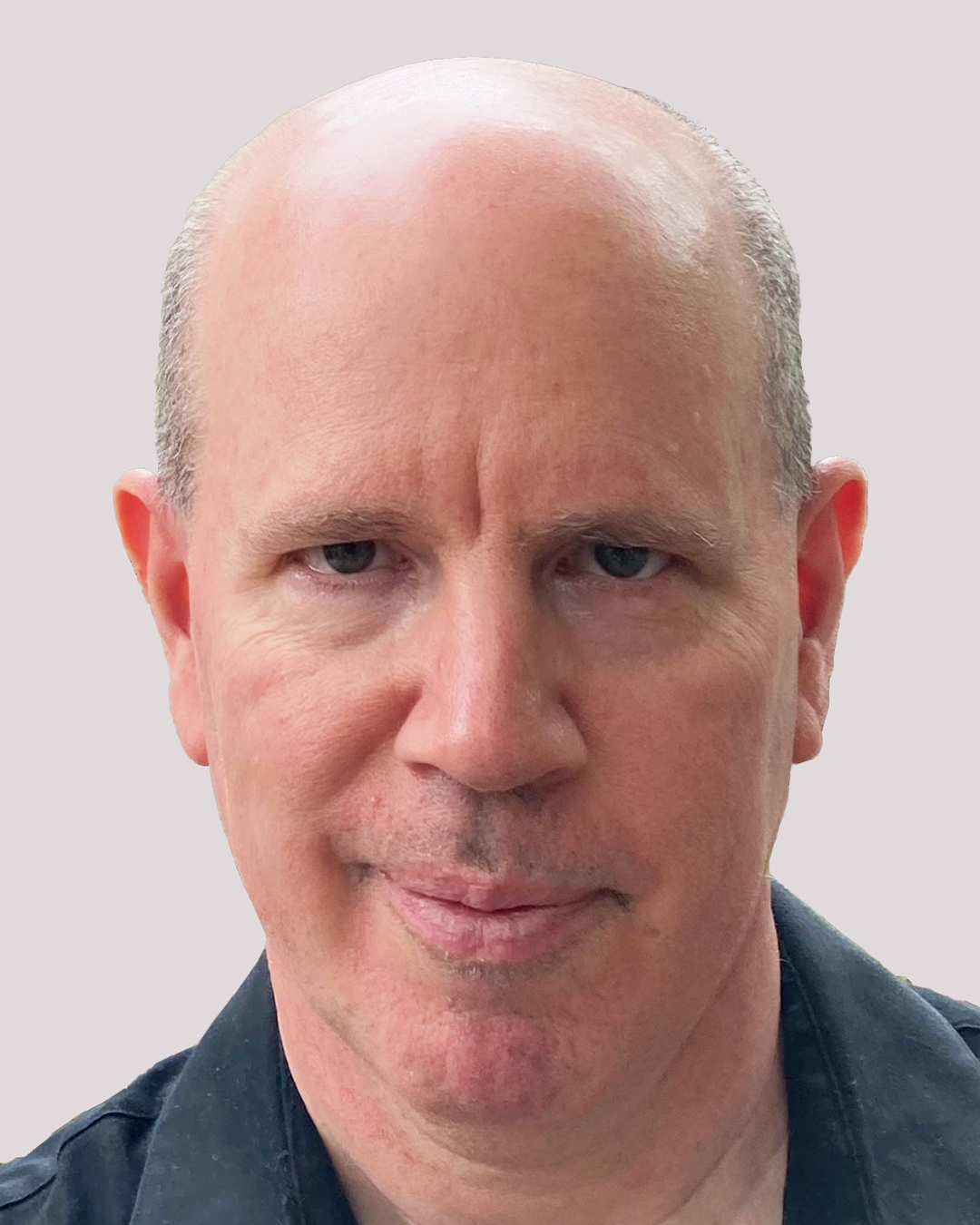-
Two CLAS faculty receive prestigious Guggenheim Fellowship
April 22, 2024
[field_pillars] -
CLAS political science student named 2024 Truman Scholar
April 22, 2024
[field_pillars] -
Meet 15 CLAS graduate students awarded prestigious fellowships to support their research and creative work
April 22, 2024
By Charlotte Brookins
A total of 15 graduate students have been named prestigious fellows by the College of Liberal Arts and Sciences, with five receiving 2024-25 Marcus Bach Fellowships and ten receiving 2024 CLAS Dissertation Writing Fellowships.
Congratulations to these deserving students!
Marcus Bach Fellowship
The Marcus Bach Fellowship, named for the 1942 University of Iowa graduate of the same name, is awarded to graduate students in the humanities to support the completion of an MFA project or doctoral dissertation. The fellowship’s goal is to foster intercultural communication and the understanding of diverse philosophies and religious perspectives.
Each fellow receives a semester of support including a $10,700 salary, a tuition scholarship for 2 semester hours credit, and more.
The five recipients for the 2024-25 school year are:
-
Caelainn Barr, Department of English (Nonfiction Writing Program), "Written in the Land"
Barr’s project is a memoir grounded in archival research and interviews that explores the intersection of religion, spirituality in nature and family history. The work is set against the backdrop of conflict in in Northern Ireland. -
Nathan Chaplin, Department of History, "Surveying the Tropics, Constructing the Heartland: Identify Formation in Nicaragua and the Midwest"
Chaplin’s project investigates the alliances formed between Nicaraguan and Midwestern elites as they attempted to manage public health crises, state policy, and capital investment during the 19th and 20th centuries. -
Spencer Jones, Department of English (Nonfiction Writing Program), “All Skillful in the Wars”
Jones’s thesis explores political and theological tensions in the lives of radical-revolutionary schoolteachers Harriet Wheeldon and Simone Weil. -
Xiaoyan Kang, Department of Theatre Arts, “The Words of Ants"
Kang’s thesis takes the form of a play drawing inspiration from the 1983 script Nüshu, or the script of women. Through it, the playwright intends to explore how individual experiences are interpreted to serve a particular narrative. -
Mariana Mazer, Department of Spanish and Portuguese, “The book as an object and container of multiple stories"
Mazer’s dissertation explores the relationship between the book as a physical object and the narratives it contains, ultimately printing and binding eight copies of the finished thesis.
CLAS Dissertation Writing Fellowship
The CLAS Dissertation Writing Fellowship is awarded annually to 10 graduate students, providing time and funding for the completion of a PhD dissertation. The fellowship provides a total of $14,000 to each student.
-
Brittany Anderson, Department of Anthropology, “Attunements of Care: The Role of Housekeeping and Laundry Staff in Midwest Continuing Care Retirement Communities”
Anderson’s dissertation explores the roles of housekeeping and laundry staff in continuing care retirement communities play in the complexity of providing care for residents. -
Isabel Baldrich, School of Art and Art History, “Caribbean Stain: Erasure and Creoleness in Parisian Art”
Baldrich’s dissertation intends to emphasize the importance of French Caribbean heritage in 18th and 19th century French art. -
Francisca Diaz, Department of Psychological and Brain Sciences, “The Role of Numerical and Nonnumerical Magnitudes in Discriminative Behavior: A Comparative Study”
In her dissertation, Diaz seeks to compare the roles of numerical and nonnumerical properties in effective information analysis. -
Dominic Dongilli, Department of American Studies, “Interspecies America: Animal Lives and Reproductive Politics at the Smithsonian National Zoo”
Dongilli’s thesis examines encounters between human and nonhuman animals at the Smithsonian National Zoo, arguing that zoos mediate U.S. identities, cultures, and environmental futures in which humans and nonhuman bodies interact.
-
Adriana Fernández I Quero, Department of Mathematics, “Rigidity results for group von Neumann algebras with diffuse center”
Fernández I Quero’s dissertation explores von Neumann algebras, a kind of mathematical framework initially created for studying particle physics, and its relationship with diverse subjects such as continuous model theory. -
Katharine Gilbert, Department of French and Italian, “Navigating Language Hierarchies in the Indian Ocean and the Caribbean: Women, Memory, Communities”
Gilbert’s research focuses on the use of language by Francophone writers from former French colonies in the Indian Ocean and the Caribbean. -
Sun Joo Lee, School of Music, “Therapeutic Singing and Semi-Occluded Vocal Tract Exercises for Individuals with Parkinson’s Disease”
Lee’s thesis examines the benefits of semi-occluded vocal track exercises and therapeutic group singing as a treatment for Parkinson’s Disease. -
Mengmeng Liu, Department of Communication Studies, “Navigating subversiveness: Digital Feminist Play and Resistant in Women-Centered Media Practices in China”
Liu’s dissertation intends to examine contemporary gender politics, feminist discourses, and digital dynamics in China. -
Briante S. L. Najev, Department of Biology, “How do environmental stressors influence a snail with variable ploidy and reproductive modes?”
Najev’s dissertation investigates how nutritional limitation and population density influence the chromosomal makeup of the destructive, globally invasive New Zealand mud snail. -
Caleb Pennington, Department of History, “Shades of Green: Historical Perceptions of the U.S. Environmental Movement”
Pennington’s research analyzes how early opponents of the U.S. environmental movement fostered negative stereotypes of environmentalists in order to dictate the public perception of conservation.
[field_pillars] -
-
Opera channels creativity of CLAS jazz studies associate professor
April 22, 2024
[field_pillars] -
CLAS journalism students pitch potential business ideas to the Iowa Heartlanders
April 22, 2024
By Emily Delgado
Students in the University of Iowa School of Journalism and Mass Communication learned what it takes to build a sports business through a partnership with the Iowa Heartlanders, a professional minor league hockey team based in Coralville.
This is the second time the class — Business of Sport Communication — taught by lecturer Charles Munro partnered with the team. Students got an inside look into what it takes to create a sports league team and met with Iowa Heartlanders staff.

“The students had to figure out setting it up, how you staff it, where the money goes, how you finance it, how you sell rights to it. We spent, as a class, a great deal of time on discussing what it takes to build a sports business,” Munro said.
Munro comes to the University of Iowa after a successful journalism career spanning three decades as a journalist, manager, industry consultant, and educator. He’s worked in newsrooms across the country and won two Emmy awards for news coverage.
Business of Sports Communication has been offered for five years. At its core, it's an experiential learning class that allows students to experience the world of sports media, business and communication. The College of Liberal Arts and Sciences is home to various courses that expose students to this kind of learning outside of the classroom.
Third-year journalism student Colin Votzmeyer said the class had a great environment that prioritized absorbing the material rather than chasing a grade, something Votzmeyer was grateful for.
“There's a lot of leeway for what you're learning, what you want to pursue, how you want to tackle certain projects,” Votzmeyer said. “Professor Munro would just say, this is what I expect from you and now run with it. You're just experimenting with sports business. It was a mesh of different kinds of experiences.”
At the beginning of the course, students were able to go into Xtream Arena and meet with the business and communications team for the Iowa Heartlanders. The staff was very open to talking with students.
“They were all very receptive to us. Reaching out if we needed help with anything, which was very appreciated coming from people who are professionals in the industry,” Votzmeyer said.
At the end of the semester, students came up with business pitches for the Heartlanders team.
“On the very last day of the semester, two Heartlanders people came in, and each team made their presentation, and they did great,” Munro said.
It was a proud moment for Munro.
“They had some really great ideas,” he said. “Some ideas surrounded transportation to and from the arena and how they could put together a night for students.”
The idea for this class came from the want and need of students to learn about the other side of communications — like the business side — while still tying in the value of journalism and mass communication to the sporting world and our culture across the world more broadly.
“In the journalism school you can be in classes that really hone in on techniques of writing and producing and chasing a story, but it's good to balance that out with a class where we're able to come in, sit down, and be sponges for what the sports landscape is like,” Votzmeyer added.
[field_pillars] -
Six CLAS staff members honored with 2024 Staff Excellence Awards
April 18, 2024
[field_pillars] -
Four CLAS faculty receive 2024 Hubbard-Walder Award for Excellence in Teaching
April 17, 2024
[field_pillars] -
CLAS art history professor named fellow in medieval studies academy
April 12, 2024
By Charlotte Brookins
Robert Bork, professor and director of graduate studies in the School of Art and Art History, is one of only seven fellows named to the Medieval Academy of America’s 2024 Fellowship Class.
The Medieval Academy of America (MAA) was first established in 1925 and works to propagate a scholarly community with the goal of deepening and disseminating knowledge of medieval history in a way that is equitable, accessible, and inclusive. The fellowship class is nominated on an annual basis, with up to 150 fellows at one time.
“I feel deeply honored to join this group, which includes only a few art historians,” says Bork.
As described on its website, the purpose of the MAA’s fellowship program is to honor long-term academic achievements in the field of medieval studies. Fellows work as a group to use their raised profile as medievalists to ensure the continued vitality of their field.
Bork, who has been with the University of Iowa College of Liberal Arts and Sciences for just over 25 years, says his time at the university has contributed to his development as a scholar and professor in many ways.
“Most concretely, the university has supported my work with internal grants such as the Faculty Scholar program, the Arts and Humanities Initiative, and grants for conference and research travel,” Bork explains, referring to the AHI-funded trip in which Bork and a small group of students and staff traveled to France. On this trip, the group used laser scanners to create precise 3D models of Gothic cathedrals important to Bork’s current research.
“The university has also supported my applications for external grants such as those from the Humboldt Foundation, the National Gallery of Art, and the American Council of Learned Societies, which have been crucial to my book projects,” he adds.
Bork has appeared in numerous publications detailing his research in medieval studies.
Bork majored in physics before embarking on his career in architectural history, and he notes that much of his research utilizes his multifaceted background, something that is supported by the university and college’s strength in a variety of programs.
“I would urge students to take advantage of this breadth by taking a wide range of classes during their years here,” says Bork. “At the same time, I encourage students to share their diverse interests with their faculty mentors, since undergraduate research can open up valuable and unexpected opportunities, as I have seen in my own career.”
Bork will be formally inducted as an MAA Fellow during the organization’s annual meeting in March.
[field_pillars] -
Three CLAS faculty involved in search committee for next vice president for research
April 12, 2024
[field_pillars] -
CLAS faculty members receive 2024 Discovery and Innovation Awards
April 12, 2024
[field_pillars]
- Page 1
- ››
